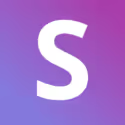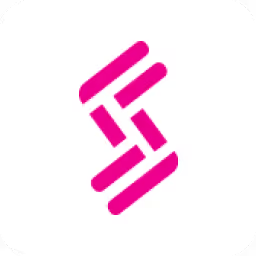Bizzy Alternatives
Considering a switch from Bizzy? This guide compares 10 alternatives, analyzing their features, pricing, and potential drawbacks to inform your decision.
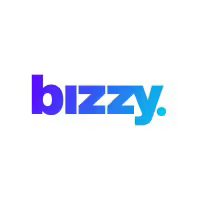
Bizzy is a solid choice for many sales teams, especially those targeting European B2B markets. It excels at lead generation and targeted outreach, with a large database that helps users find prospects in specific niches. These are justified reasons to use the tool.
However, some users report that contact data can occasionally be incomplete or outdated. We've analyzed the top Bizzy alternatives based on G2 reviews, comparing their pros and cons to help you find the right fit for your team. Let's get started.
Consider 11x for Your Sales Team
Before the main list, consider 11x. If your team wants digital workers for sales tasks, 11x offers autonomous agents for outreach and follow-ups. This method is different from standard lead generation tools.
11x is a go-to-market platform that uses AI agents to automate the sales process. An agent named Alice finds prospects, handles outreach on email and LinkedIn, and maintains the CRM. A second agent, Julian, qualifies inbound leads and books meetings. This approach combines data enrichment, outreach, and email warmup into one tool.
Bizzy Alternatives
Here are the top Bizzy alternatives, reviewed in detail. We cover each tool's pricing, main features, and its advantages and drawbacks compared to Bizzy.
1) ZoomInfo SalesOS
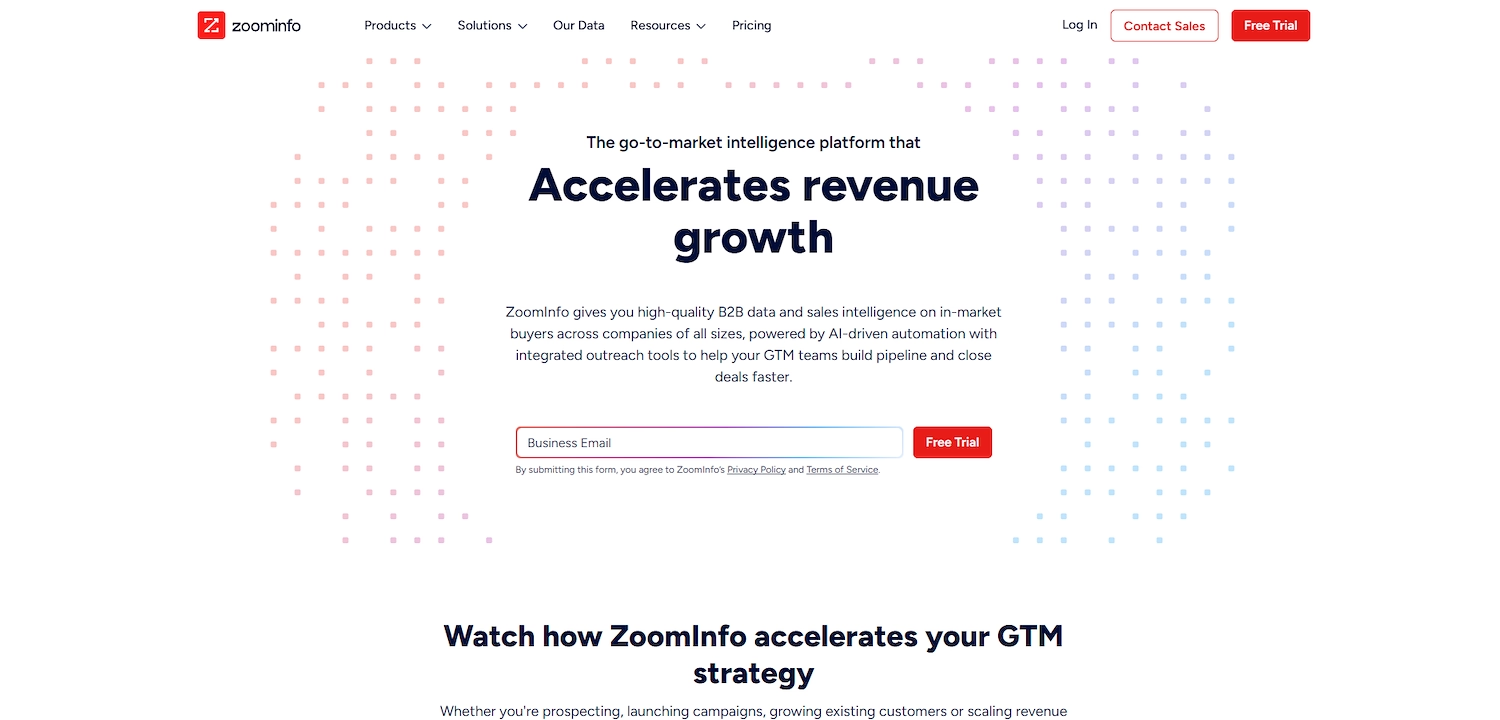
ZoomInfo SalesOS is a go-to-market intelligence platform that helps B2B organizations identify and connect with buyers. The system unifies contact and company data with buyer-intent signals and automation tools.
For data enrichment, it appends and refreshes CRM data in real time. The platform also automates data hygiene and other GTM workflows, with enterprise-grade data access available through an API for tech stack integration.
ZoomInfo SalesOS's Main Features
- Analyzes every call and meeting interaction with conversation intelligence to provide insights.
- Identifies anonymous website visitors and turns them into potential sales leads.
- Uses predictive modeling to find accounts that match the ideal customer profile.
- Offers a generative-AI companion to surface insights and draft outreach messages.
How ZoomInfo SalesOS Compares to Bizzy
Average Review score: 4.5/5 stars based on 8,738 G2 reviews.
- ZoomInfo SalesOS includes conversation intelligence to analyze calls and meetings. This feature provides insights into sales interactions, a function not present in Bizzy's standard toolkit.
- The platform identifies anonymous website visitors and turns them into potential leads. This is different from Bizzy, which focuses on outbound prospecting from its existing database.
- The tool provides buyer intent data and predictive modeling to find accounts ready to purchase. This approach is more proactive than Bizzy's database search functionality.
- Its automation for data hygiene keeps CRM information current in real time. This helps maintain data accuracy, addressing a known issue where Bizzy's contact data can be outdated.
Where Bizzy Has an Edge Over ZoomInfo SalesOS
- ZoomInfo SalesOS can have a higher cost and a one-month implementation time. This might present a larger initial investment for teams, while Bizzy may offer a more accessible entry point.
- The tool's data is very broad, which sometimes means it is less specialized for certain European B2B niches. Bizzy, in contrast, has a strong focus on these specific markets.
- Its wide range of features can create a steeper learning curve for new users. Some teams may find Bizzy's more focused lead generation toolkit easier to adopt for immediate use.
Pricing and Cost-Effectiveness
Bizzy provides a free plan, while its paid tiers require a custom quote. ZoomInfo SalesOS also uses a quote-based model and is generally perceived as a higher-cost option, making Bizzy’s free tier a more accessible entry point for teams with limited budgets.
2) Apollo.io
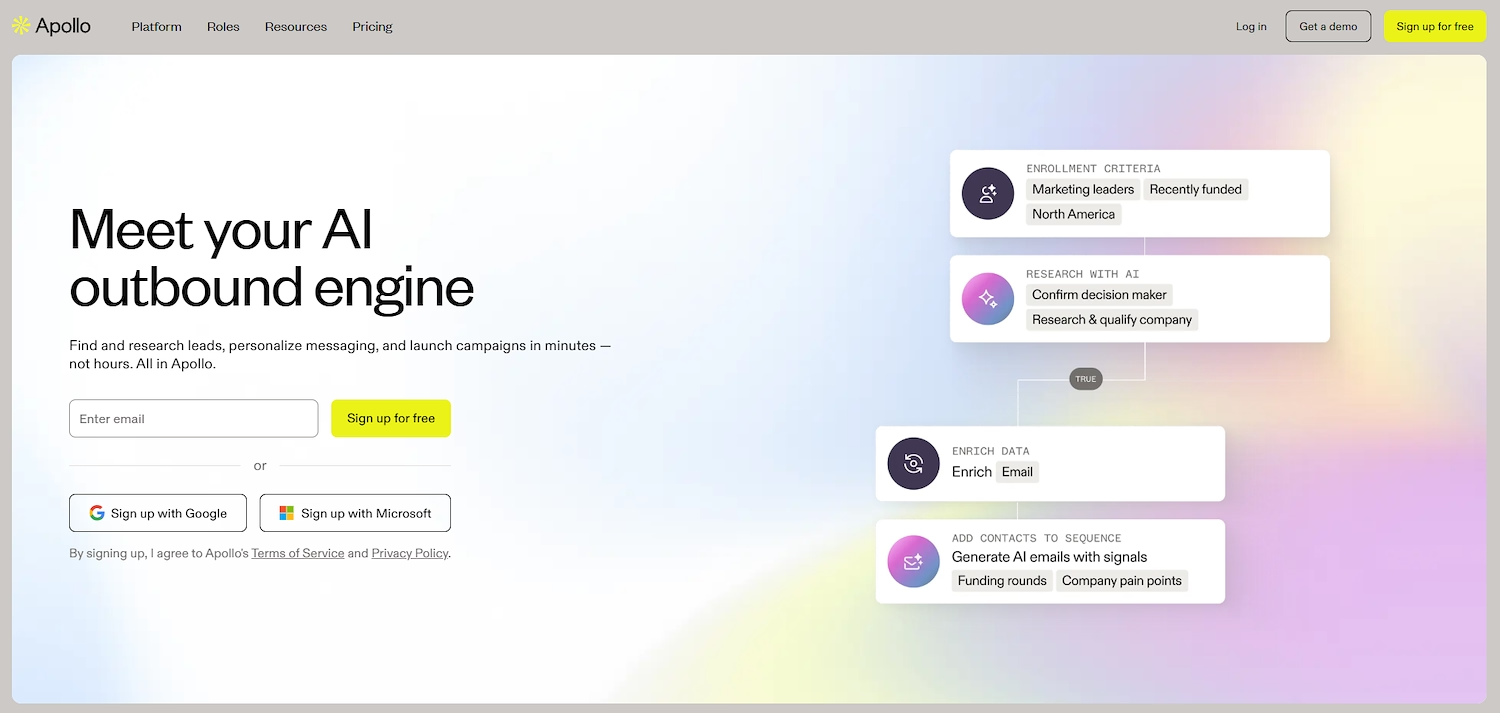
Apollo.io is a sales platform with B2B contact and company data. For data enrichment, it lets users refresh and add to their records. The system also has tools to find prospects and use automated outreach, which helps teams build a pipeline on accurate data.
Apollo.io's Main Features
- Offers a database containing B2B contact and company data.
- Lets users refresh and add to their records for data enrichment.
- Provides tools to find prospects and use automated outreach.
- Helps teams build a sales pipeline using accurate data.
How Apollo.io Compares to Bizzy
Average Review score: 4.7/5 stars based on 8,904 G2 reviews.
- Apollo.io integrates data enrichment, outreach automation, and analytics into a single platform. This is different from Bizzy, which concentrates more on lead generation from its database.
- The tool includes an engagement suite for creating automated outreach sequences. This helps teams manage the entire communication process, while Bizzy's main function is finding prospects.
- It offers a larger database with over 210 million global contacts. This provides a broader reach than Bizzy’s specialized focus on European B2B markets.
- Apollo.io has transparent pricing tiers, including a free plan. This approach contrasts with Bizzy's quote-based model for its paid plans, which can make it simpler for teams to predict their expenses.
Where Bizzy Has an Edge Over Apollo.io
- Apollo.io provides a very large global database. This sometimes results in less specialized data for niche European B2B sectors, where Bizzy offers a more targeted and focused dataset.
- The platform's extensive feature set can present a steeper learning curve for new users. Bizzy's more focused approach to lead generation may feel more straightforward for teams that need to start quickly.
- For teams that only need a dedicated lead generation tool, Bizzy's specific functionality can be more direct. Apollo.io is an all-in-one platform, so its extra features might be unnecessary for users with singular prospecting needs.
Pricing and Cost-Effectiveness
Both tools offer a free plan, but Apollo.io provides transparent paid tiers starting at $49 per user monthly, making its costs more predictable than Bizzy's quote-based model. You can see the detailed pricing on Apollo.io 's official website.
3) Clearbit
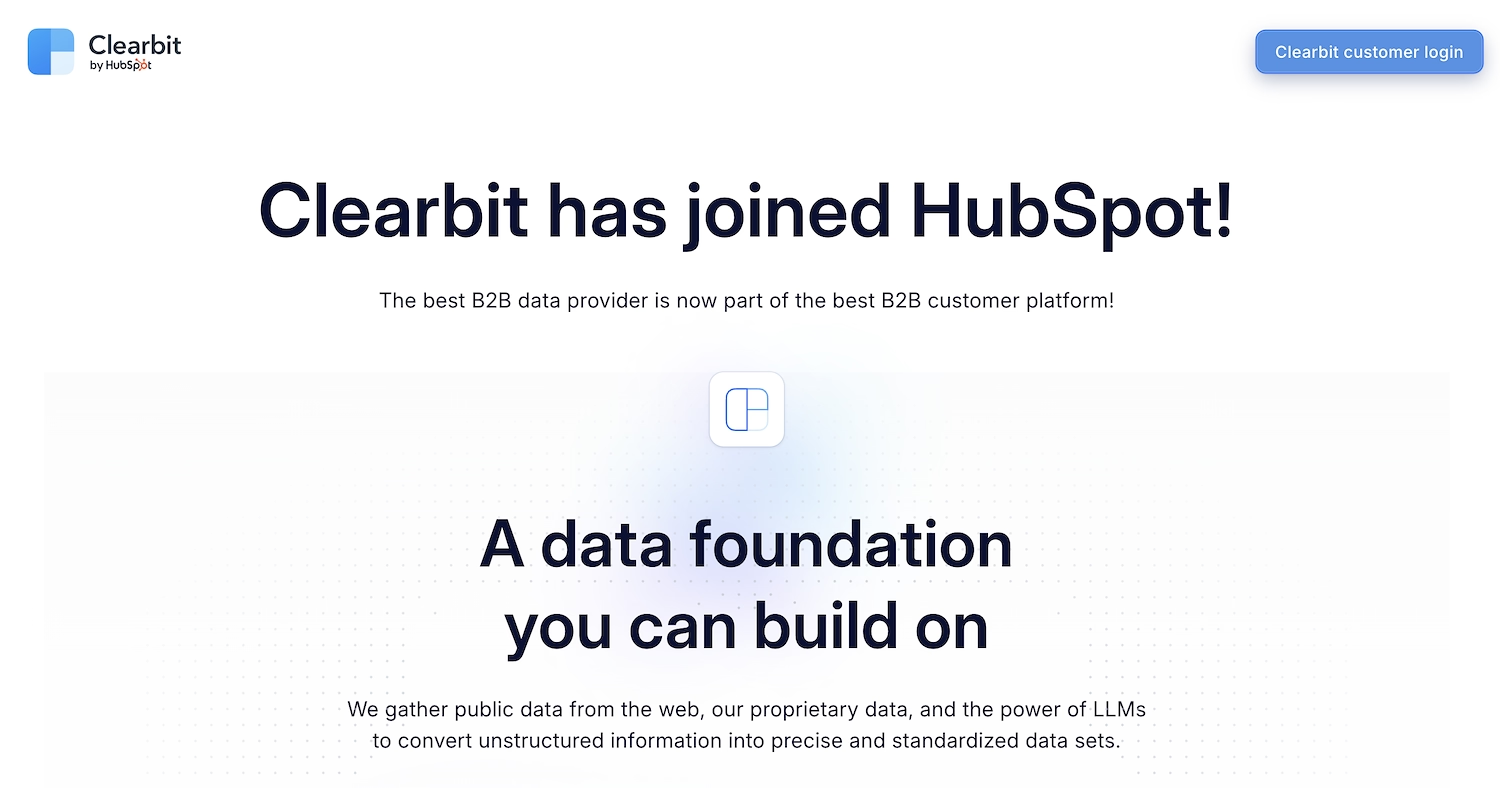
Clearbit, now part of HubSpot, is a data layer for HubSpot’s customer platform. It collects public and proprietary data, then uses language models to build standardized datasets. This process provides clean company and contact information worldwide.
The service enriches CRM records with firmographic and demographic details. This data forms a foundation for marketing, sales, and service work inside HubSpot.
Clearbit's Main Features
- Aggregates public web data and proprietary sources with LLM processing to deliver standardized B2B datasets.
- Scores and routes leads in real time using deep industry classifications, including 6-digit NAICS, GICS, and SIC codes.
- De-anonymizes website traffic to identify visiting companies that match an ideal customer profile.
- Removes form fields that can be automatically enriched to reduce friction and increase conversion rates.
How Clearbit Compares to Bizzy
Average Review score: 4.4/5 stars based on 626 G2 reviews.
- Clearbit integrates directly into HubSpot to enrich existing CRM records with over 100 data points. This is different from Bizzy, which functions as a separate database for lead generation.
- It identifies anonymous companies visiting your website, creating a source of inbound leads. Bizzy, in contrast, focuses on outbound prospecting from its contact list.
- The platform shortens website forms by automatically filling in data for known visitors to help increase conversions, a feature not found in Bizzy.
- Using detailed industry codes, Clearbit scores and routes leads in real time. This automates a step that is typically manual when using Bizzy's lead lists.
Where Bizzy Has an Edge Over Clearbit
- Clearbit works best inside HubSpot for data enrichment. Bizzy operates as a separate lead generation tool, which can be more direct for teams that do not use HubSpot and need a dedicated prospecting solution.
- Bizzy provides a specialized database for European B2B markets. Some users may find Clearbit's global data less focused for very specific European niches where targeted information is necessary.
- The tool is designed for data enrichment and requires integration. This might be complex for teams that only need to find new leads. Bizzy offers a more focused solution for pure outbound prospecting.
Pricing and Cost-Effectiveness
Bizzy offers a free plan, while its paid tiers are quote-based. Clearbit also uses a custom pricing model and is generally considered a higher-cost option with no free tier. While you can check Clearbit's official website for details, Bizzy’s free plan is more accessible for teams on a budget.
4) Lusha
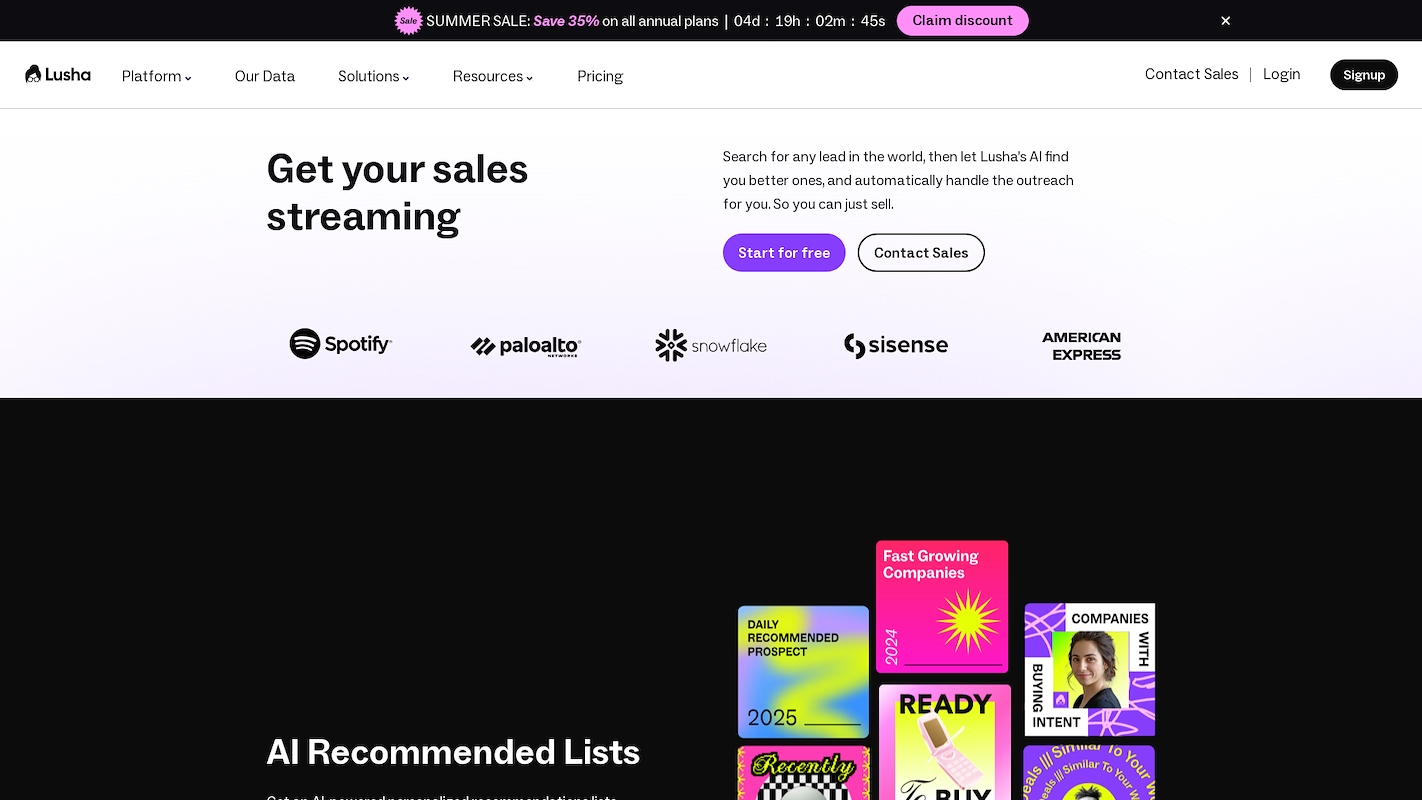
Lusha is a B2B intelligence platform that provides access to company and contact data. For data enrichment, it helps sales teams update and complete their records with direct dials and email addresses.
This information supports sales and marketing outreach. The data also helps build a more complete customer profile in a CRM.
Lusha's Main Features
- Provides AI-recommended lists of companies and decision-makers based on an ideal customer profile.
- Identifies in-market buyers with intent data and sends real-time alerts on buying signals.
- Records and analyzes sales meetings to provide insights through its Lusha Conversations tool.
- Offers a browser extension to capture contact information directly from LinkedIn and other websites.
How Lusha Compares to Bizzy
Average Review score: 4.3/5 stars based on 1,516 G2 reviews.
- Lusha uses AI to recommend prospect lists that fit an ideal customer profile. This automates list building, which is a manual search process in Bizzy.
- The tool identifies in-market buyers through intent data and provides real-time alerts. This is a proactive feature for timing outreach, which differs from Bizzy's database-centric prospecting.
- Its conversation intelligence tool records and analyzes sales meetings. This provides insights into sales interactions, a function not available in Bizzy's standard offering.
- A browser extension lets users find contact information directly on websites like LinkedIn. This offers a different workflow from Bizzy, which requires users to work within its platform for lead generation.
Where Bizzy Has an Edge Over Lusha
- Lusha's database is global. For teams that target very specific European B2B sectors, Bizzy's specialized dataset may provide more focused results.
- The tool uses a credit system that some users find restrictive for high-volume outreach. Bizzy's model may be a better fit for teams that need extensive access to its niche database.
- Its platform includes many features like intent data and conversation analysis. A team that requires only a dedicated prospecting tool might find Bizzy's focused approach more straightforward for its needs.
Pricing and Cost-Effectiveness
Both Lusha and Bizzy provide a free plan, but Lusha offers more transparent paid tiers starting at $36 per user monthly. This provides predictable costs, whereas Bizzy’s paid plans are quote-based. You can check the detailed pricing on Lusha 's official website.
5) Hunter
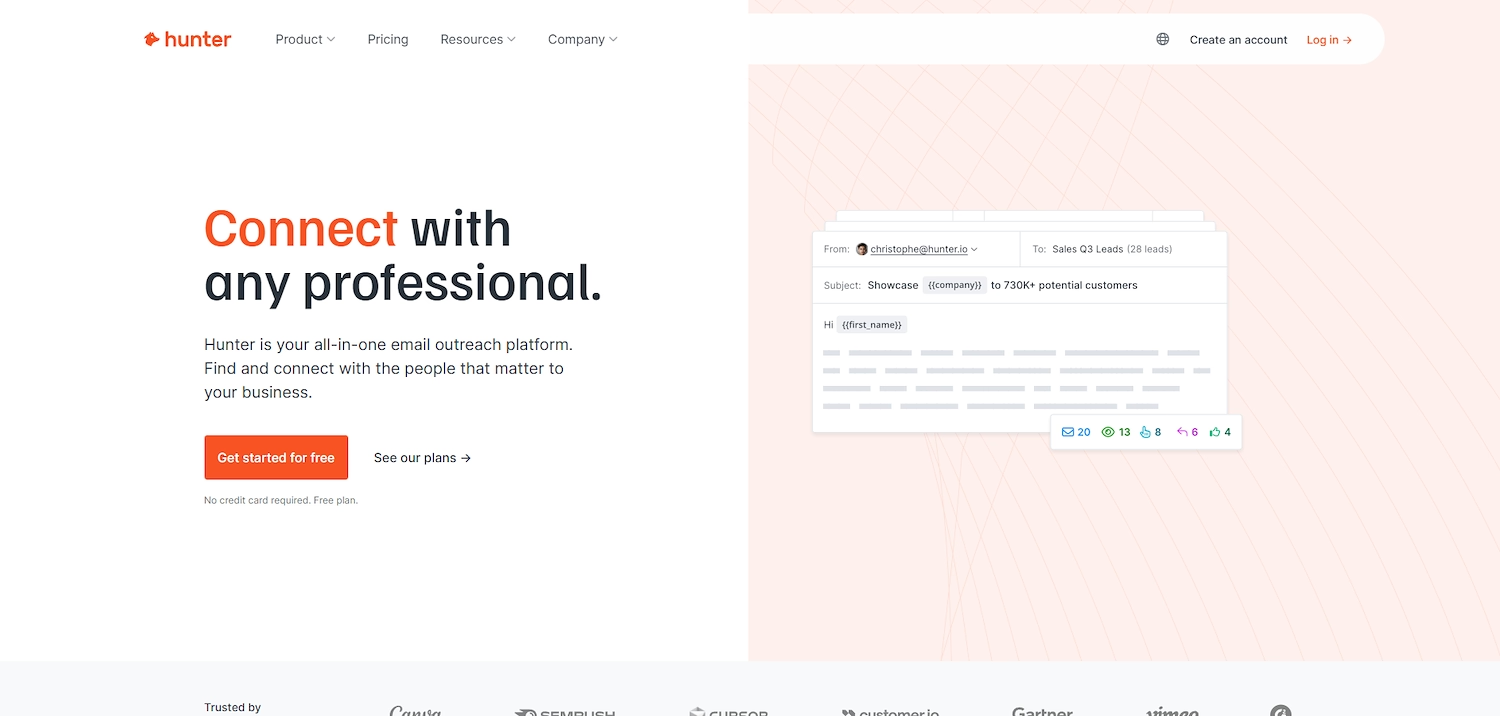
Hunter is a platform to find and verify professional email addresses. It collects data from public sources across the web. This information allows sales and marketing teams to perform outreach and enrich their contact lists.
The tool offers an email search by company domain or a person's name. It also provides an API to integrate its data enrichment capabilities with other applications.
Hunter's Main Features
- Validates email lists in bulk to reduce bounce rates and protect sender reputation.
- Manages cold email campaigns with personalized messages and scheduled follow-ups that send from a Gmail or Outlook account.
- Lists websites by the technology stack they use to allow for targeted prospecting.
- Offers a browser extension for one-click email discovery while browsing websites.
How Hunter Compares to Bizzy
Average Review score: 4.4/5 stars based on 592 G2 reviews.
- Hunter validates email lists in bulk to reduce bounce rates and protect sender reputation. This is different from Bizzy, where users sometimes report that contact data is outdated.
- The tool includes a feature to manage cold email campaigns with personalized messages and follow-ups. This provides an all-in-one solution, while Bizzy focuses on providing the lead list.
- It allows users to find prospects based on the technology a company uses. This offers a more technical targeting method compared to Bizzy's industry-focused database.
- A browser extension lets users find email addresses with one click while on a website. This workflow is more flexible than searching for leads only within the Bizzy platform.
Where Bizzy Has an Edge Over Hunter
- Hunter collects data from public web sources. This method can sometimes result in less specific information for niche European B2B markets, where Bizzy offers a more focused dataset.
- The tool focuses mainly on finding and verifying email addresses. For teams that need detailed company information beyond contact details, Bizzy's platform might offer a more complete profile for prospecting.
- Its primary function is to find a specific person's email address. In contrast, Bizzy's platform is designed more for discovering new leads within specific industries, which offers a different approach to prospecting.
Pricing and Cost-Effectiveness
Both tools offer a free plan, but Hunter’s transparent paid tiers, starting at $49 per month, provide more predictable costs than Bizzy’s quote-based model. You can check the detailed pricing on Hunter's official website.
Consider 11x for Sales Automation
If your team wants to explore digital workers for sales, 11x offers a different approach. Its AI agents handle tasks like prospecting, outreach, and lead qualification. This can be a useful option for teams that want to automate parts of their sales process.
This model shifts the focus from manual data work to automated execution. Decision-makers who are interested in an agent-based system can see how this technology fits their operations with 11x. More information is available on their website.
At 11x, we run your sales playbook with AI. Our agent Alice finds accounts, enriches data, and begins outreach, while Julian qualifies prospects and schedules meetings. This single platform handles intent signals and email warmup, replacing other tools in your GTM stack.
Book a demo to see 11x in action.
6) Seamless.AI
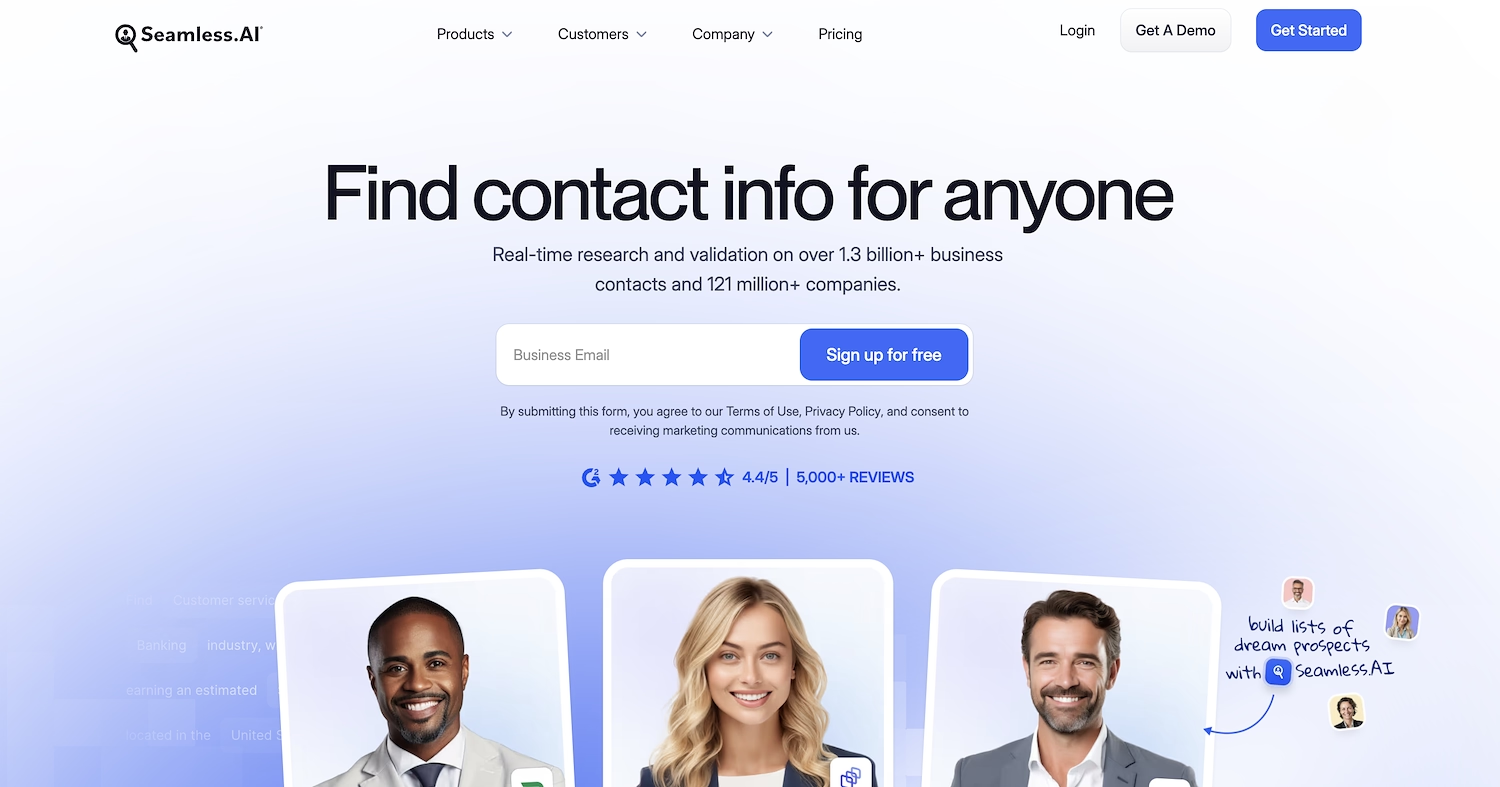
Seamless.AI is a real-time search engine for B2B data. The platform uses artificial intelligence to find and verify cell phones, emails, and direct dials for professionals.
For data enrichment, it automatically adds complete contact and company data to a CRM. This information helps sales teams build prospect lists and prepare for outreach.
Seamless.AI's Main Features
- Surfaces prospects who are ready to buy using buyer intent data.
- Monitors job changes for customers and prospects and automatically delivers new contact information.
- Generates research and personalized messages for outreach with AI pitch intelligence.
- Automates the list-building process to maintain a full sales pipeline with an autopilot feature.
How Seamless.AI Compares to Bizzy
Average Review score: 4.4/5 stars based on 5,067 G2 reviews.
- Seamless.AI uses a real-time search engine to find and verify contact information with AI. This approach helps maintain data accuracy, unlike Bizzy's database model, which can sometimes contain outdated information.
- The tool identifies prospects who are ready to buy using buyer intent data. This provides a proactive approach, while Bizzy requires users to manually search its database without these signals.
- It monitors job changes for contacts and automatically provides their new information. This automated tracking helps maintain relationships, a feature not available in Bizzy's standard toolkit.
- Its AI pitch intelligence generates research and personalized messages for outreach. This automates a part of the sales process, whereas Bizzy focuses on providing the contact list for manual outreach.
Where Bizzy Has an Edge Over Seamless.AI
- Seamless.AI provides a global database. For teams that target specific European B2B sectors, Bizzy's specialized data may offer more relevant prospects.
- The tool uses a credit-based system to access data. Some users find this restrictive for high-volume prospecting, while Bizzy's model might be a better fit for teams that need extensive database access.
- Its platform includes advanced features like AI pitch intelligence. Teams that only need a dedicated prospecting tool might find Bizzy's focused approach more direct for their specific needs.
Pricing and Cost-Effectiveness
Bizzy offers a free plan, while its paid tiers are quote-based. Seamless.AI also provides a free entry point with credits and uses a custom quote model for its paid plans, which are generally perceived as a higher-cost option.
7) Cognism
Cognism is a sales intelligence platform that provides B2B contact and company data with a focus on GDPR compliance. It helps teams find contact information and enriches existing CRM records. The data is gathered from public and proprietary sources and verified for accuracy.
Cognism's Main Features
- Provides GDPR-compliant contact data, with a focus on the EMEA market.
- Offers phone-verified mobile numbers, known as Diamond Data®, for higher connect rates.
- Includes buyer intent data to identify accounts actively researching solutions.
- Features a browser extension to find contact details on LinkedIn and company websites.
How Cognism Compares to Bizzy
Average Review score: 4.6/5 stars based on 1,138 G2 reviews.
- Cognism emphasizes GDPR compliance and provides phone-verified contact data. This focus on data quality and legality addresses a common concern with Bizzy, where data can sometimes be outdated.
- The platform includes buyer intent data to help teams prioritize outreach. This is a proactive feature that Bizzy's database-prospecting model does not offer.
- Its browser extension allows for finding contact information directly on websites. This offers a more flexible workflow than working exclusively within the Bizzy platform.
Where Bizzy Has an Edge Over Cognism
- Cognism is positioned as a premium tool and generally has a higher cost. Bizzy's free plan and potentially lower entry price can be more suitable for teams with smaller budgets.
- Bizzy's platform is more focused on lead generation. Teams that do not need advanced features like intent data may find Bizzy's straightforward approach easier to adopt.
- While Cognism has strong EMEA data, Bizzy's specialization in certain European B2B niches might provide more targeted results for very specific industries in that region.
Pricing and Cost-Effectiveness
Bizzy offers a free plan, while its paid plans are quote-based. Cognism does not have a free plan and uses a custom pricing model, positioning it as a higher-cost option. You can request a quote on Cognism's website.
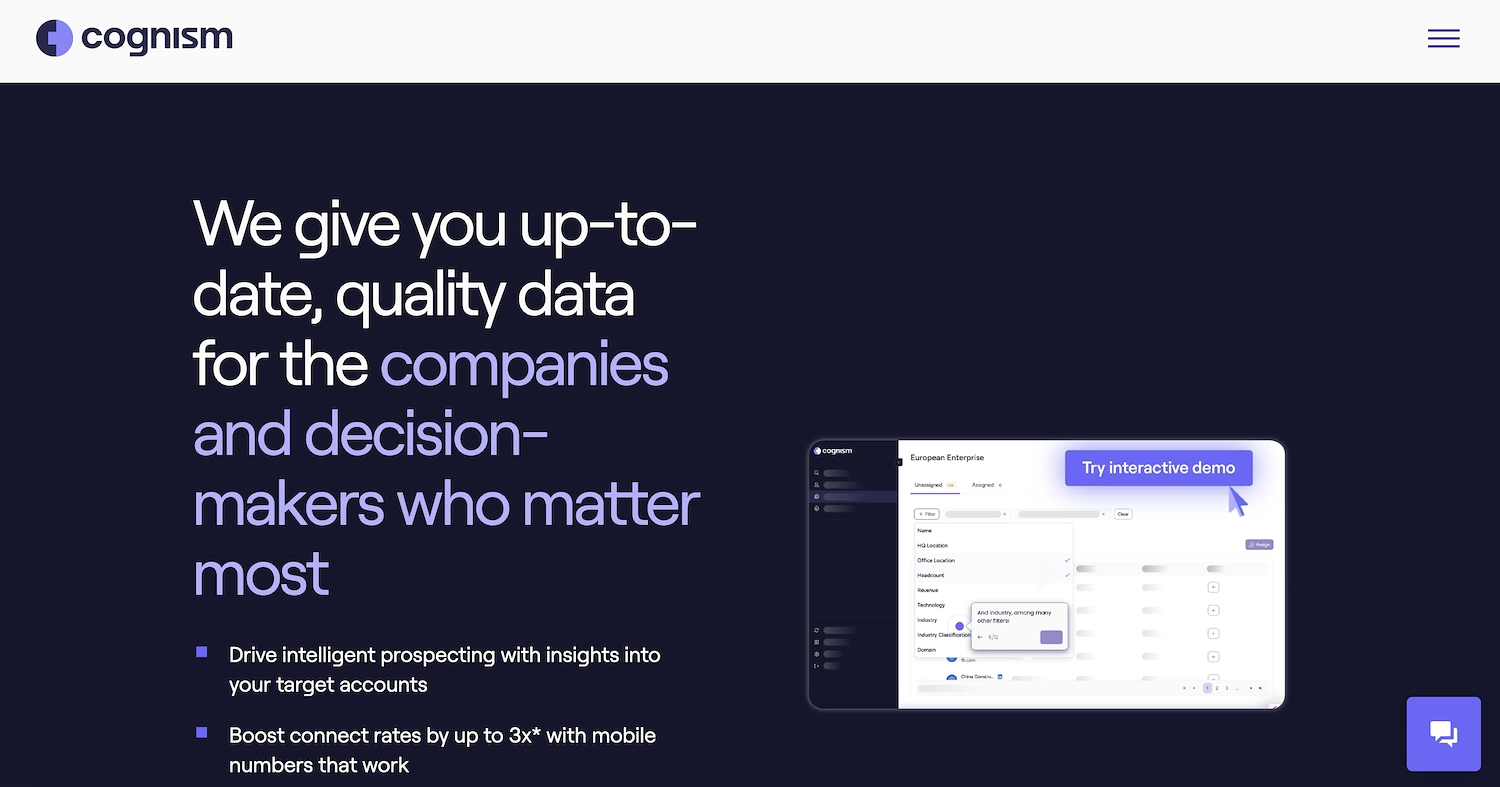
Cognism is a sales intelligence platform for B2B contact and company data. It helps teams find contacts and add details to CRM records. Data comes from public and proprietary sources, with a verification process for accuracy. The platform also focuses on GDPR compliance and provides phone-verified mobile numbers.
Cognism's Main Features
- Provides phone-verified, human-checked mobile numbers, known as Diamond Data®, to reduce misdials and increase connect rates.
- Supplies a database of VP-level and higher decision-makers that is screened against Do-Not-Call lists for compliant outreach.
- Identifies buying signals using data on hiring trends, funding rounds, and technographic changes.
- Includes a sales companion browser extension that provides contact suggestions and AI-powered search.
How Cognism Compares to Bizzy
Average Review score: 4.6/5 stars based on 1,033 G2 reviews.
- Cognism provides phone-verified, GDPR-compliant contact data, which improves connect rates. This is a key difference from Bizzy, where data accuracy can sometimes be an issue.
- The platform includes buyer intent data to identify accounts actively researching solutions. This proactive feature is not available in Bizzy's database-prospecting model.
- Its browser extension allows users to find contact information directly on websites. This offers a more flexible workflow than working only within the Bizzy platform.
- The tool screens its database against global Do-Not-Call lists for compliant outreach. This provides a level of security that is not a central feature of Bizzy.
Where Bizzy Has an Edge Over Cognism
- Cognism is positioned as a premium tool and generally has a higher cost. Bizzy's free plan can be more suitable for teams with smaller budgets or those who want to test the service first.
- The tool's wide range of features can create a steeper learning curve for new users. Some teams may find Bizzy's more focused lead generation toolkit easier to use for immediate prospecting needs.
- For teams that need a dedicated lead generation tool for a specific niche, Bizzy's functionality can be more direct. Cognism is a comprehensive platform, so its extra features might be unnecessary for users with singular prospecting needs.
Pricing and Cost-Effectiveness
Bizzy offers a free plan, while its paid tiers are quote-based. Cognism does not have a free plan and uses a custom pricing model, positioning it as a higher-cost option. For detailed information, visit Cognism's official website.
8) Lead411
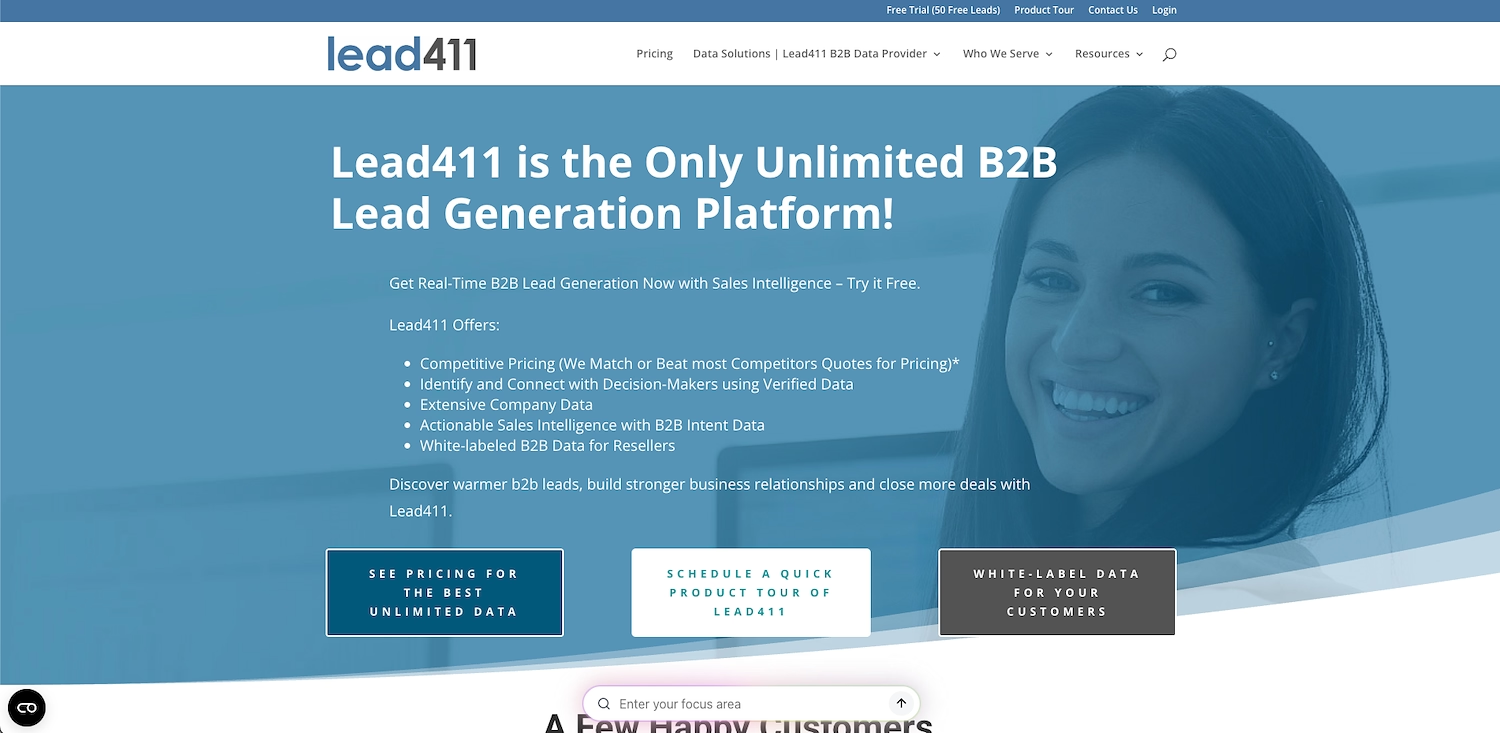
Lead411 is a B2B data platform with verified contact and company information. For data enrichment, it adds direct dials and emails to CRM records. The platform also offers intent data to identify companies that show purchase signals, which helps sales teams with outreach.
Lead411's Main Features
- Provides buyer intent data powered by Bombora to identify companies based on their research topics.
- Uses growth intent data, such as recent funding and hiring plans, to find companies in a buying cycle.
- Includes a native email automation feature for setting up and managing outreach campaigns.
- Features an AI dashboard that automatically tracks key indicators for important leads.
How Lead411 Compares to Bizzy
Average Review score: 4.5/5 stars based on 466 G2 reviews.
- Lead411 provides buyer intent data from Bombora to identify companies based on their online research. This is different from Bizzy, which requires users to search its database without these buying signals.
- The tool uses growth intent data, such as recent funding or hiring plans, to find companies in a buying cycle. Bizzy's platform does not offer this type of proactive signal for timing outreach.
- It includes a native email automation feature to set up and manage outreach campaigns. In contrast, Bizzy provides the lead list, but users need a separate tool to contact prospects.
- An AI dashboard automatically tracks key indicators for important leads. This automates a monitoring process that is manual when using lead lists from Bizzy.
Where Bizzy Has an Edge Over Lead411
- Lead411 offers a broad, global database. For teams that need highly specific data in European B2B niches, Bizzy's specialized focus may provide more relevant contacts.
- The platform includes advanced features like intent data and email automation. Teams that require a simple tool just for lead generation might find Bizzy's focused functionality more direct for their needs.
- Some users report that the Lead411 platform can feel clunky. In contrast, teams that need a very straightforward interface for quick prospecting may find Bizzy's more focused design easier to navigate.
Pricing and Cost-Effectiveness
Bizzy offers a free plan, while its paid tiers are quote-based. Lead411 provides a transparent Basic plan at $75 per user monthly, with other plans requiring a custom quote. This makes Bizzy’s free tier a more accessible entry point, but Lead411 offers more predictable costs for its initial paid plan.
9) UpLead
UpLead is a B2B prospecting platform that provides contact and company data with a 95% accuracy guarantee. It helps sales teams build targeted lists and enrich their existing records with verified information.
The platform uses real-time verification for its data. This ensures that emails and contact details are current. It also offers technographic data and buyer intent signals to help with outreach timing.
UpLead's Main Features
- Offers a 95% data accuracy guarantee on its B2B contact and company information.
- Provides real-time email verification to reduce bounce rates.
- Includes technographic data to target companies based on the software they use.
- Features a browser extension to capture contact data from LinkedIn and company websites.
How UpLead Compares to Bizzy
Average Review score: 4.7/5 stars based on 1,911 G2 reviews.
- UpLead offers a 95% data accuracy guarantee, which directly addresses a potential issue with Bizzy where data can be outdated.
- The platform includes real-time email verification. This is a proactive measure to ensure data quality, unlike Bizzy's static database model.
- It provides technographic and intent data. This allows for more advanced targeting than Bizzy's focus on industry and location.
- UpLead's browser extension allows for prospecting on the web. This offers more workflow flexibility than working only inside the Bizzy platform.
Where Bizzy Has an Edge Over UpLead
- Bizzy's specialized focus on European B2B markets may yield more relevant contacts for teams targeting that region, compared to UpLead's global database.
- UpLead's features, such as intent data, might be unnecessary for teams that only need a simple lead generation tool. Bizzy's focused approach can be more direct.
- The platform operates on a credit system. For teams with high-volume outreach needs, this model can sometimes be more restrictive than other pricing structures.
Pricing and Cost-Effectiveness
Bizzy has a free plan and quote-based paid tiers. UpLead offers a free trial with credits and has transparent pricing plans starting at $74 per month. This makes UpLead's costs more predictable for teams that need a paid plan.
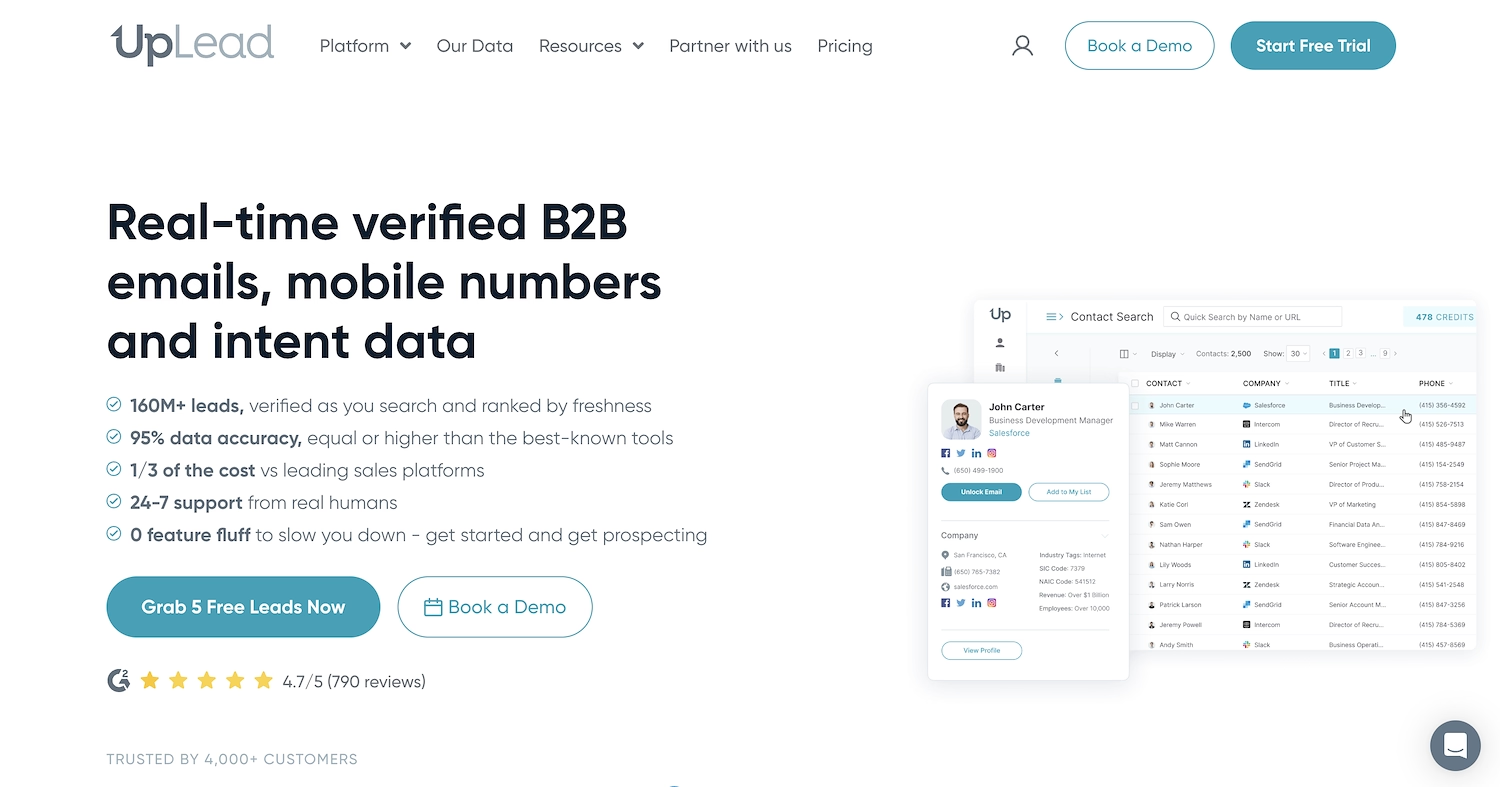
UpLead is a B2B platform that provides contact and company data with a 95% accuracy guarantee. It helps sales teams create targeted lists and enrich their existing records with verified information.
The platform uses real-time verification to keep contact details current. This process supports data enrichment with accurate emails. It also offers technographic data and buyer intent signals to help with outreach.
UpLead's Main Features
- Offers more than 50 search filters, including intent data, to find in-market buyers.
- Integrates with Salesforce, HubSpot, and other CRMs via Zapier to automate workflows.
- Provides real-time verified contact data, including mobile numbers and emails.
- Includes a lead builder tool for creating targeted prospect lists from its database.
How UpLead Compares To Bizzy
Average Review score: 4.7/5 stars based on 797 G2 reviews.
- UpLead offers a 95% data accuracy guarantee with real-time email verification. This is different from Bizzy, where users sometimes report that contact information is outdated.
- The tool provides intent data to identify companies that actively look for solutions. This feature helps find active buyers, a different approach from Bizzy's standard database search.
- It includes over 50 search filters, including technographics. This allows for more specific targeting than Bizzy, which primarily focuses on industry and location.
- Its integration with major CRMs like Salesforce and HubSpot automates workflows. This is a contrast to Bizzy, which operates more as a standalone platform for lead generation.
Where Bizzy Has An Edge Over UpLead
- UpLead provides a global database, which is useful for broad outreach. For teams that need to find contacts in very specific European B2B sectors, Bizzy's specialized dataset sometimes offers more targeted results.
- The tool includes many advanced features like technographics and over 50 filters. Teams that require a simple tool just for lead generation might find Bizzy's focused functionality more direct for their needs.
- Its free offering is a trial with a limited number of credits. In contrast, Bizzy provides a free plan, which can be a better option for small teams with ongoing but low-volume prospecting needs.
Pricing and Cost-Effectiveness
Bizzy has a free plan and quote-based paid tiers. UpLead offers a free trial and transparent pricing plans starting at $99 per month. This makes UpLead's costs more predictable for teams needing a paid plan, while Bizzy's free plan is more accessible for ongoing, low-volume use.
10) RocketReach
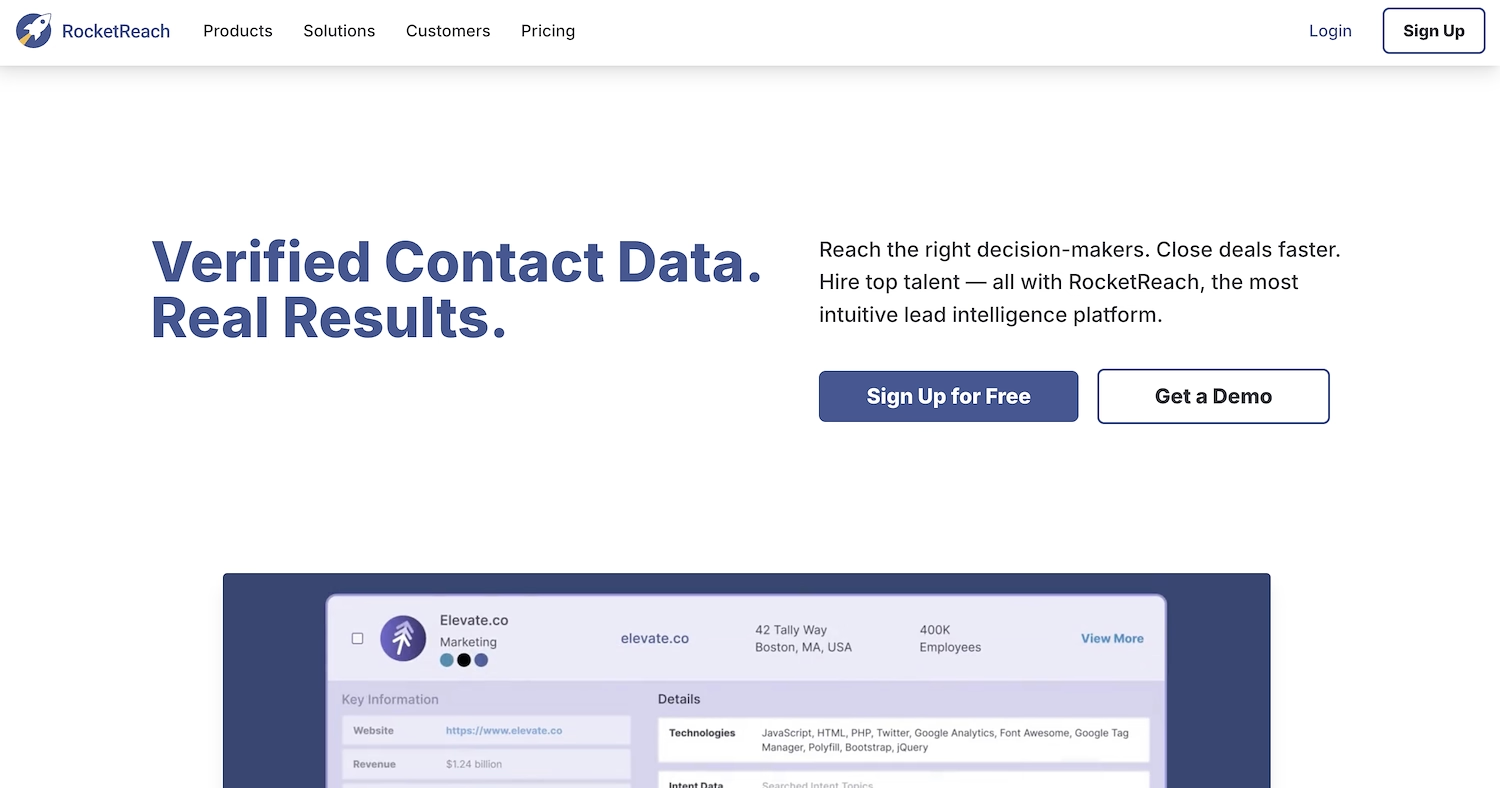
RocketReach is a B2B data platform with a real-time search engine for professional contacts. It aggregates information from public sources to build its profiles.
For data enrichment, the tool finds and verifies emails, phone numbers, and direct dials. This allows sales teams to update and complete their records with contact details for outreach.
RocketReach's Main Features
- Provides access to a database of over 700 million professionals across 35 million companies.
- Offers advanced search capabilities, bulk lookups, and browser extensions for Chrome and Edge.
- Includes an autopilot feature to create automated workflows for discovering and engaging with prospects.
- Integrates with platforms like Salesforce, HubSpot, and Salesloft through a powerful API and prebuilt connections.
How RocketReach Compares to Bizzy
Average Review score: 4.4/5 stars based on 918 G2 reviews.
- RocketReach provides access to a database of over 700 million professionals, which offers a much broader global reach compared to Bizzy's specialized focus on European markets.
- It uses a real-time search engine to find and verify contact information. This approach helps maintain data accuracy, a point of contrast with Bizzy's static database where information can sometimes be outdated.
- The tool includes an autopilot feature to automate workflows for prospect discovery and engagement, while Bizzy's process relies more on manual searches.
- Its platform integrates with CRMs like Salesforce and HubSpot for automated data syncs. Bizzy, in contrast, functions more as a standalone tool for lead generation.
Where Bizzy Has an Edge Over RocketReach
- RocketReach offers a massive global database. For teams that target specific European B2B industries, Bizzy's focused dataset may provide more suitable contacts.
- The platform includes advanced features like automated workflows. A team that requires a simple tool to find leads might find Bizzy's straightforward functionality easier to use.
- Its data comes from a wide range of public sources. Some users find this can result in less detailed information for niche markets, where Bizzy's specialized data collection might be more effective.
Pricing and Cost-Effectiveness
Both Bizzy and RocketReach offer a free plan. RocketReach has transparent paid tiers starting at $99 per month, while Bizzy’s paid plans are quote-based. This makes RocketReach's costs more predictable for teams needing a paid subscription.
Which One Should You Go With?
The right Bizzy alternative depends on your team's specific needs, budget, and target market. This guide reviewed several top options to help you make an informed decision.
For teams interested in sales automation, 11x offers a different approach with AI agents. These agents handle prospecting, outreach, and lead qualification, which can replace multiple tools in your sales stack.


